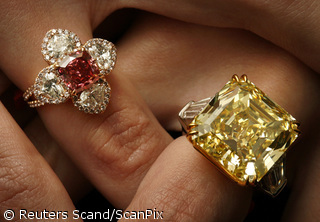And now, wearable technology. Call it wearware
Published:
28 March 2001 y., Wednesday
IBM in the jewelry business? Dutch electronics maker Philips selling street wear jackets? American high-tech start-ups creating space-age shades? Yes, yes and yes.
AT THIS YEAR’S CeBIT, IBM is showing studies of wearable computer add-ons such as a silver necklace with a hidden microphone, a lady’s display watch, earrings with speakers, and a ring whose elegant turquoise stone doubles as a nifty scroll-point mouse. Last year, Philips got together with jeans maker Levi Strauss for a limited edition of “wearable electronics garments” — jackets with a GSM mobile and an MP3 player in special pockets, with a small remote control on the front flap of the jacket and a microphone in the collar. The two devices work together, with the music turning itself off when you talk on the phone. (Available only in Europe, all 800 jackets quickly sold out). And about half a dozen companies are working on special glasses that use sophisticated optics to create screen-size images in front of your eyes.
One of the more intriguing developments in the industry is the push by some of the biggest companies into what’s become known as “wearables” — computers and accessories we can use on the go, while we’re busy doing other things. Wearables are already widespread in industry, where workers often need access to information but also need to keep their hands free. Workers building aircraft use head-mounted displays and speech-input devices for complex assembly tasks, which frees them from referring to lengthy manuals.
British Airways in experimenting with a crew of roaming check-in attendants at Heathrow’s Terminal 4, outfitted with keyboards on their forearms and a mini-display on a headset. Bell Canada sends its service technicians out to fix phone lines wearing a small computer in their pocket, a keyboard or touch-screen strapped to their wrist, and a helmet equipped with an optical display and a digital camera that beams pictures of trouble spots back to the maintenance center, wirelessly. Having quick access to precise instructions while they’re up on some telephone pole lets workers do more work in less time, says Daniel Butler, an executive at Fairfax, Virginia-based Xybernaut, maker of the wearable system BA and Bell Canada use.
Šaltinis:
NEWSWEEK
Copying, publishing, announcing any information from the News.lt portal without written permission of News.lt editorial office is prohibited.
The most popular articles
 At the national war memorial in New Delhi, India's war widows and daughters remember their fallen.
more »
At the national war memorial in New Delhi, India's war widows and daughters remember their fallen.
more »
 By 2020, three out of four people employed in the EU will be working in services like insurance, healthcare, retail and education, according to a new report on the future of the European job market.
more »
By 2020, three out of four people employed in the EU will be working in services like insurance, healthcare, retail and education, according to a new report on the future of the European job market.
more »
 Berlin Zoo's very pleased about the new arrival, as she's the first hippo to be born in Berlin in three years.
more »
Berlin Zoo's very pleased about the new arrival, as she's the first hippo to be born in Berlin in three years.
more »
 MEPs and EU ministers are trying to reach an agreement on how many hours we should work and whether countries should continue to be allowed to opt out of these rules.
more »
MEPs and EU ministers are trying to reach an agreement on how many hours we should work and whether countries should continue to be allowed to opt out of these rules.
more »
 Tanks, guns, socks: the buying of military equipment like this from abroad is complicated due to export rules all being different.
more »
Tanks, guns, socks: the buying of military equipment like this from abroad is complicated due to export rules all being different.
more »
 The life-size replica of the real monument of love has just opened to the public.
more »
The life-size replica of the real monument of love has just opened to the public.
more »
 A series of ice statues symbolizing the dangers of global warming welcomed delegates to the climate change conference taking place in Poznań this week.
more »
A series of ice statues symbolizing the dangers of global warming welcomed delegates to the climate change conference taking place in Poznań this week.
more »
 The diamond is 35.56 carats and dates back to the 17th century.
more »
The diamond is 35.56 carats and dates back to the 17th century.
more »
 Around two million muslims performed the pilgrimage on their haj, which in the past has been tarred by hotel collapses and stampedes.
more »
Around two million muslims performed the pilgrimage on their haj, which in the past has been tarred by hotel collapses and stampedes.
more »
 Yuebin or Happy Guest restaurant became Communist China's first private restaurant.
more »
Yuebin or Happy Guest restaurant became Communist China's first private restaurant.
more »